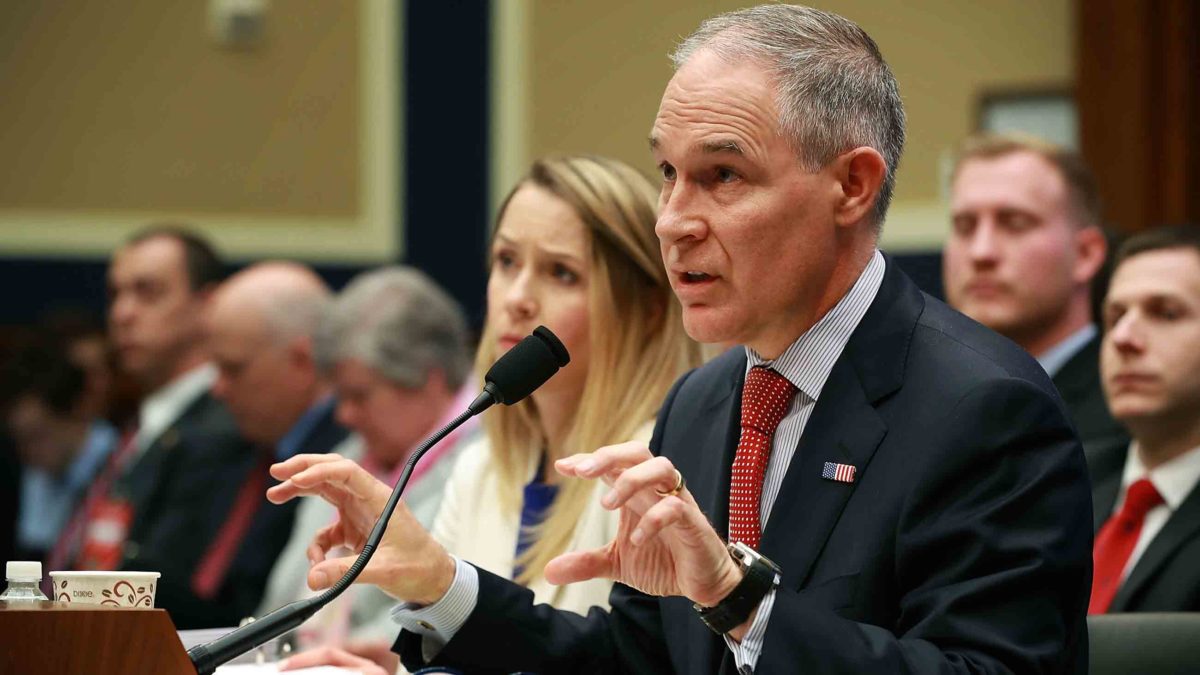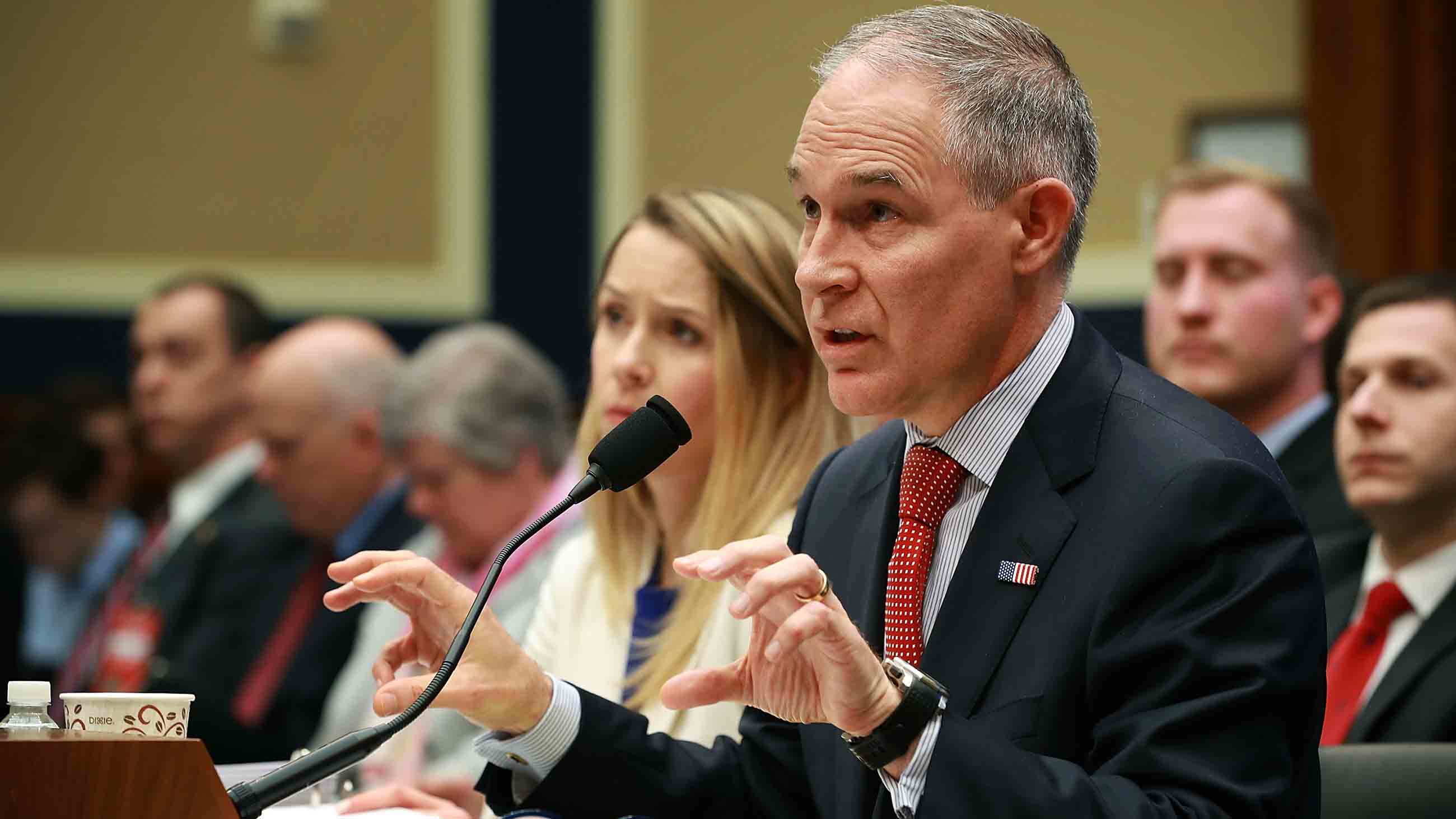The nation’s embattled Environmental Protection Agency administrator can’t seem to stay out of the limelight.

EPA administrator Scott Pruitt testified before a subcommittee of the House Energy and Commerce Committee on Thursday.
Visual: Chip Somodevilla/Getty Images
Scott Pruitt appeared before two congressional committees on Thursday, ostensibly to talk about the EPA budget and policies. But Greg Walden, a Republican congressman from Oregon and chairman of the House Energy and Commerce committee acknowledged to BuzzFeed News that “members of both sides of the aisle also have serious questions [about] the management and operations of the agency.”
Those questions, the subject of at least 10 federal investigations, included everything from Pruitt’s round-the-clock use of security detail to his regular booking of first-class travel to the installation of a $43,000 soundproof booth in his office.
The White House Office of Management and Budget, along with the EPA itself, is looking into that purchase, which the Government Accountability Office has already determined broke the law. In a 23-page document released ahead of the hearings, Pruitt responded by saying that while he had requested increased privacy for taking sensitive phone calls, other EPA officials oversaw this purchase. The document also included explanations regarding his travel, email accounts, and the rental of a condo unit from the wife of an oil and gas lobbyist whose clients had business with the EPA. During the hearings, Pruitt placed much of the blame on his aides and other EPA staffers.
Reacting to these and other alleged ethics violations, 170 Democrats have called for Pruitt to resign. At the House Energy and Commerce environment subcommittee hearing on Thursday, John Sarbanes, a Democratic representative from Maryland, told Pruitt he had “become the poster child for the abuse of public trust.” And an anonymous EPA employee at one of the agency’s regional offices told Wired that Pruitt’s ouster would be “great for morale.”
Just a few days ago, the agency head signed a proposed transparency rule — at a ceremony ironically closed to the press — which aims to restrict the types of research the EPA uses to develop its policies. The rule, which would have to go through a public comment period before being finalized, would require researchers to make their data publicly available. This would place restrictions on public health studies, critics say, which are subject to patient privacy laws.
Also in the news:
• Apparently ignoring a good deal of social science, the Trump administration issued new funding priorities late last week that favor abstinence programs over other measures aimed at curbing teenage pregnancy rates — and along the way eased rules that required rigorous evidence of the effectiveness of intervention programs overall. The moves, while not unexpected, triggered immediate reactions among evidence-based policy advocates, who argued that numerous studies have shown abstinence programs to have little impact on sexual activity among teenagers, and that other tactics — including those that emphasize contraception and protected sex — have been shown to be more effective. The new rules are tantamount to “starting from ground zero,” one critic was quoted as saying, “as if nothing has been learned.” (New York Times)
• Earlier this month, leaders from 25 European countries signed a declaration to increase research in artificial intelligence, or AI — largely in an effort to catch up with the United States and China and boost its competitiveness in the field. On Wednesday, the European commission went one step further, announcing it would invest €1.5 billion ($1.83 billion) in AI funding until the year 2020. Along with increasing investments in research and innovation, and supporting business-education partnerships to attract and keep more AI talent in Europe, the commission is taking what Bernhard Schölkopf, a machine learning researcher at the Max Planck Institute for Intelligent Systems, calls a “European angle on AI” that he says values privacy, transparency, and fairness. A set of ethical guidelines is expected by the end of the year. (Science)
• Sinclair Broadcasting — the media giant that last month forced hundreds of its local news anchors to recite the same script on false news — failed to renew the contract of a reporter in Lynchburg, Virginia for refusing to “balance” her stories on climate change in a more conservative direction. Of a planned October 2015 segment, the reporter’s news director wrote that management felt “the story was one-sided — indicating that human activity is to blame for global warming — period,” even though the scientific consensus affirms that humans are the major cause. The reporter, Suri Crowe, said she viewed the story as environmental, not political, and using her coverage of the flu for comparison, said she didn’t “remember a time when for balance I went out to a group of 20 people who are nutjobs that say flu shots kill.” (BuzzFeed News)
• Astronomical mapping data on more than 1 billion stars, as well as myriad other solar system objects, quasars, and space dust, was released by the European Space Agency to much fanfare on April 25. The Gaia Spacecraft plotted its second major batch of data since 2016, when the spacecraft first produced data on the distances and motions of approximately 2 million stars. Gaia’s new, improved 3D color map of the Milky Way galaxy was unveiled in Berlin this week; research teams around the world reported waiting eagerly for the online open release of data for their own studies and rapidly began running analyses. Initial analyses appear in a series of papers online in Astronomy and Astrophysics. The “Gaia Data Release 2” is anticipated by many in the community to lead to new paradigms of understanding, as well as greater knowledge of and new discoveries about the history of the galaxy. (Science News)
• Tiny particles of cigarette butts, paint, plastic packaging, nylon, and polyester were found scattered through Arctic sea ice – almost 12,000 tiny fragments per icy liter – according to an analysis published this week by a team of German researchers. The scientists said the amount of microplastic found was as much as three times as high as that recorded in previous sampling missions. Lead scientist Gunnar Gertz, of the Alfred Wegener Institute’s Helmholtz Center for Polar and Marine Research noted that so much of the material is now stored in Arctic ice that the region effectively serves as a distribution center for circulating plastic components elsewhere. An independent researcher with the British Antarctic Study described the German research as a benchmark study, saying it demonstrated that microplastics are now ubiquitous in the world’s oceans, and that “nowhere is immune.” (The Guardian)
• And finally: In recent years, the worldwide death toll from malaria has plummeted — from more than 800,000 deaths in 2000 to about 445,000 in 2016 (two-thirds of them children under 5). Much of the credit goes to a plant-based compound called artemisinin, which helps rid the body of the parasites that cause the disease. (Its discoverer won a Nobel Prize in 2015.) But the compound is in short supply because the plant that makes it — the Chinese shrub known as sweet wormwood — is so stingy: Its leaves are less than 1 percent artemisinin. Now Chinese researchers have genetically engineered a wormwood plant with more than triple that yield, they report in the journal Molecular Plant: 3.2 percent. (The work took several years, because the plant’s genome is among the most complex ever studied, with 63,000 protein-coding genes, about three times as many as the human genome.) They are sending seed samples to a wormwood farm in Madagascar, and they say that “hopefully our high-artemisinin transgenic lines will be grown at a massive scale next year.” (Science Daily)










